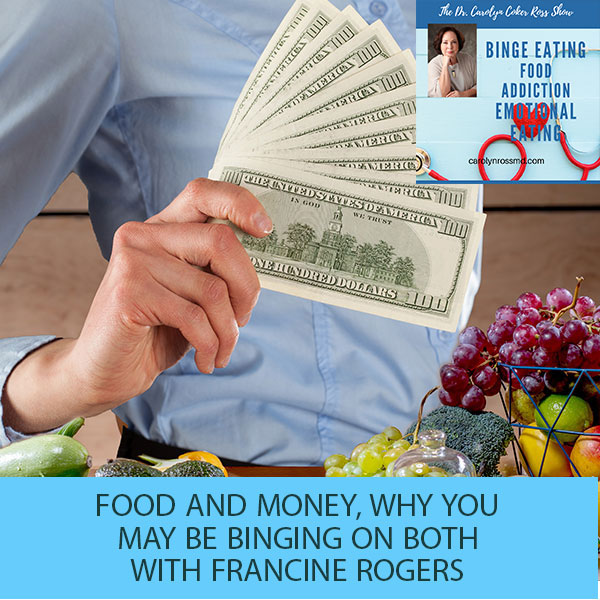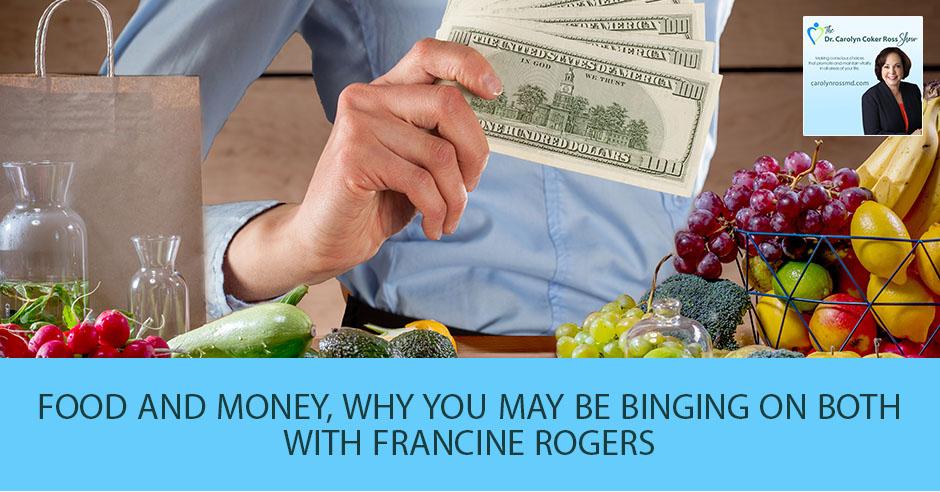
For some people, their bad credit score and bad money habits didn’t necessarily come from mismanaging money. Sometimes, it’s from an emotional dysfunctional neediness inside of them. The emotions that drive us to binge or overeat compulsively are the same ones that lead to overspending. This is exactly true for liability account specialist Francine Rogers. For Francine, when she gets stressed about her business, she ate and spent money irresponsibly. Most of the time it has nothing to do with being hungry or needing a little snack or something. There was always something emotional going on, and she sees that correlation between food and money, which means her eating disorders and financial problems. After facing her own disastrous finances, she began the process of restoring her credit, learning about personal finances, and creating wealth through investing and credit leveraging. Francine says having a wealth-building mindset means changing your poverty attitude.
—
Listen to the podcast here:
Food And Money, Why You May Be Binging On Both with Francine Rogers
I’m here with Francine Rogers. Welcome to the show. Francine and I are going to be talking about the overlap between eating disorders and financial problems. Let me tell you a little bit about Francine. She has previously worked at a large brokerage company where she was a professional liability account executive. She went back to school and graduated in 2016 with a degree in Business Administration from the University of San Diego. While attending USD, she had to face her own disastrous finances and began the process of restoring her credit. In addition to restoring her credit, she began to learn about personal finances and creating wealth through investing and credit leveraging. Although her credit score has increased, she realized that she had to change her poverty attitude to a wealth-building mindset.
Francine believes that to truly eradicate debt, you must delve into the emotional reasons why debt has accumulated in the first place. In her process, she examines the client’s financial goals and employs a direct upfront approach to working with individuals to achieve their desired results. Thanks again for being on this show, Francine. I think this is a topic that most people don’t think much about. They don’t think about that link between our eating behaviors and how we deal with money. What can you tell us about what you learned from your own experience?
In my own experience, I learned that when I got lonely, I ate and I spent money irresponsibly. When I got stressed, I ate and I spent money irresponsibly. My credit score, my bad money habits didn’t necessarily come from mismanaging money. It was from this emotional dysfunctional neediness inside of me. I started to make the correlation between, “Francine, you feel bad. Why are you spending money? You eat, is it because you’re lonely? Is it because you’re battling these feelings of low self-esteem?” I would eat or I would spend money, it was an either-or thing. I’m still going through this journey. I’m focused on my health right now. When I have my eating of choice, which is salty stuff, and I’m sitting there gorging a bag of potato chips, I’m like, “Francine, what is this about?” Most of the time it has nothing to do with me being hungry or I need a little snack or something. It’s always something emotional going on. I’m overwhelmed, I’m stressed, I’m depressed, I’m thinking about my business. Those are the correlations I see when I tend to spend more money or when I eat too much.
For people who tend to spend a lot of money, it’s also those same people who overeat and those people who may have restrictive food intake. Do they have possibly restrictive patterns around money? Is it over for both or under for both?
It’s an excess or it’s like either you don’t eat or you eat too much, or you drink too much or have too much sex. It’s an excess and it’s always something where it’s so out of control where you are moving into this kind of behavior and it’s never a point where there’s never enough. I remember vividly, I was so stressed about my job before I left. I came home and I ate and I ate, and I was crying. Then I sat down, and I was on the internet, Facebook and everything. I went over to Amazon and I started buying stuff. Instead of me confronting those feelings, I tend to push them away, push them down, ignore them, and I’m out of control eating or spending money. It’s important to recognize that feeling you have and start to deal with those emotions. The eating and the spending money, eventually those problems get confronted when you deal with the core problem of the emotional dysfunction or brokenness you have inside of you.
[bctt tweet=”Isolating yourself can be the biggest enabler to your dysfunction because when you’re by yourself that self-talk in your head is going off.” username=”CarolynCRossMD”]It’s interesting that the same things that cause overeating, which are the emotions that drive us to binge or overeat compulsively or emotional eating and stress eating are the same ones that lead to overspending. I was surprised to find that there are a few research studies on this very topic. There was one done in England where they looked at college students and they discovered that extreme attitudes about food and eating predicted short-term financial difficulties primarily for the women students. They talked about that being part of a vicious cycle, which is exactly what you’re describing. The author of this study said that this vicious cycle where negative attitudes toward eating increased the risk of financial difficulties is exacerbated by the emotions and stress that we’re talking about.
Some of the emotions that we see with binge eating, like feeling guilty when you’ve overeaten or feeling ashamed can then also promote that trip to Amazon.com or the Online Shopping Network. I don’t even know if anyone goes there anymore now that we have Amazon but in that study, they found more financial difficulties. They also found that many of the students come from a lower socio-economic status to begin with, and that their eating predicted these financial difficulties. I’ve also seen clients of mine who have gotten into financial trouble just from binging. The cost of the amount of food that they were charging on their credit cards and running up debt for to buy these binge foods was throwing them into financial difficulties. Have you seen that too?
Not only seen it, but I’ve also experienced it. When I sit down with a client and we talk about their budget, most clients don’t realize how much they spend money eating out. When I’m looking at their budget, I’m seeing $1,000, $1,200, $1,400 and there are only two people in their family. I look at myself, I love salty food, I love Mexican food and I used to go out to eat at least three times a day. It is very expensive. Even if you’re talking somewhere in the low amount of $20 to $25, you start doing the numbers, let’s say $20 a day times five is $100, times four weeks is $400. That’s $400 a month just by eating out and then it’s not healthy. It wreaks havoc on your budget. The thing about it is how hard is it to go in there and fix something?
It’s almost like you have this emotional brokenness that you have and you have to feed it. I used to feel good when I sit there and binge and eat. I felt good. It was like a self-soothing thing and later on, you’re like, “Francine, did you have to eat a whole pizza?” Then the guilt comes and it’s like a vicious cycle. It’s unbelievable. When I made that connection, when I started to realize that and now I’m so cognizant of it, it’s amazing how much better I feel that I have to confront the emotions without using anything, without food or without money. It’s okay to feel those emotions. I just have to determine how I soothe myself, how I recover from those temporary feelings and then move into maybe exercising or writing out my feelings or reading. It doesn’t necessarily have to be eating and spending money, but I’m learning that process as we speak.
Tell me a little bit more about changing from a poverty attitude to a wealth-building mindset. What do you mean by that?
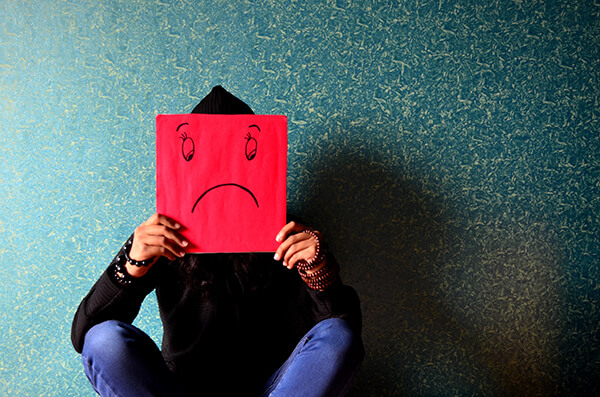
Food And Money: You have this emotional brokenness that you have to feed it.
I grew up in a single-family household and no one spoke to me about money. I paid my bills because I saw my mom pay my bills, but I always paid the minimum. I never did more. I never thought about paying my credit cards in full. When you pay your credit cards in full, it translates to during the month you’re looking at how much you’re spending on your credit cards and your mind automatically says, “Can I pay that off at the end of the month?” I always thought I can make a $25 monthly payment. I’m just good. That’s a poverty mindset.
I was reading something on Twitter and it said, “Poverty charges interest.” What that means is you ignore the little things. The light goes on in your car. You ignore it because you don’t have the money, or you don’t have the room on your credit card, you don’t have any emergency savings or anything like that. You ultimately pay more. Because you have this poverty mindset where you’re always paying the minimum, you’re not saving, you’re not budgeting, it ultimately charges interest because you’re going to be paying more on the backend with high-interest loans, paying more for a car and paying high-interest car notes. That’s what a poverty mindset essentially is.
I don’t think many people think about how if your credit score is low, then you can’t get the low-interest loans, you end up with those high-interest loans or you may not be able to buy a car on installment. You may have to go and buy a used car, a not so good car and then that can lead to not being able to make it to work. It is a vicious cycle once you’re in that poverty mindset, isn’t it?
Exactly, and the thing about it is you don’t even realize you’re in that mindset. You don’t even realize that while you’re eating out all the time. Eating out is okay if you’re eating out at fine dining, if you’re having a nice piece of fish for dinner, but when you’re going to Wendy’s 4 for 4 or something like that, fast food, each and every day, then that’s part of the whole poverty mindset. You’re thinking, “I can eat this $4 meal every day.” It’s doing havoc on your health and it’s doing havoc on your finances. I feel so much better when I have a great piece of fish, some steamed vegetables and maybe I might have a smoothie or something to help that sweet craving when I get it. I feel so much better physically and mentally. I’m able to do more. I’m able to focus more as opposed to putting all kinds of grease in my body and then feeling like crap at the end of it and feeling guilty and spending $4 when I could just come home and make a nice dinner.
[bctt tweet=”You need to surround yourself with people that are going to help you, encourage you, hold you down so you’re not by yourself.” username=”CarolynCRossMD”]It has a long-term effect too because a lot of people think of fast-food as a treat or eating out as, “I’m going to treat myself. I feel bad about myself or I’m upset or lonely or unhappy, if I eat out, it’s like treating myself.” I recognize that in my own life where I was eating out like not as much as what you’re talking about but still a lot for me, eating out four or five times a week. It was like my little adventure because I work from home. I live alone and it was my chance to get out and be around with people. I had to ask myself, “That’s great. Treat yourself but do you need to treat yourself every day? Does every meal need to be a treat and why do you need to use food as your only way of treating yourself or having a little adventure? Are there other things I could do to treat myself instead?”
I work from home and I get a little isolated at times. I want to talk to people. Instead of me going somewhere to eat, I go take a walk on the beach. It clears my head. I’m outside, I talk to people, I meditate, I pray, I feel so alive when I’m at the beach. You have to find that place that gives you those type of emotions, those types of feelings where you’re at peace where you’re not out of control and gorging on something, whether it’s alcohol, eating, spending money. You have to find those activities that give you that kind of calmness and peace.
For our audience who’s identifying with what we’re talking about, can you talk a little bit about how you made that transition from a poverty attitude to a wealth-building mindset? What were the steps that you went through that are helping you because you said you’re still in the process?
It was like a moment. I got tired of feeling the way that I did. I got tired of being unhappy. I got tired of always thinking that I’m less than everyone else because of my weight or because of my long-lasting low self-esteem. I had to look at myself and value myself for who I was and love myself where I was at. Part of it was I was making a lot of money, but I wasn’t seeing the fruits of it. I wasn’t investing, I wasn’t saving any money. All I was doing was consuming, spending and eating. This has been going on for 25, 30 years and I got so tired of it. When I went back to school, I knew there was a bigger purpose in my life and I could not fulfill that purpose because I was stuck in this place all the time. I started taking small steps because I always say, “Success is in your daily routine.” When you’re talking about breaking the habit of overeating, binging and eating salt every day for twenty plus years, it’s hard to do it all in one day. You have to make small steps. I cut out eating salt.

Food And Money: When we share our stories, it gives people the freedom to share their own story.
It’s like a big step though, not a small step.
I was still eating fast-food but I will tell them, “No salt on anything.” It didn’t have the same flavor for me because I love salt and it changed my appetite. Then I started eating at home a little bit more. I started walking a little bit more. Then I had to consult with somebody. I’ve been talking with my chiropractor for years about my weight and I finally went to him and said, “I can’t do this anymore. I’m tired of feeling this way. I’m tired of being frustrated all the time.” Emotionally, I’d be driving and I want to call somebody out. There were all kinds of emotions wrapped up with me feeling as miserable as I was. I started making small steps. As I started taking these small steps towards happiness, being fulfilled and being at peace, it helped me make the big step to walk away from my job, which was making me very unhappy and start my own business.
I want to re-emphasize this for our audience is that the first step is becoming awake with what is going on in your life. Why are you so miserable and what are the things that are causing you to be miserable? It sounds like you became more aware of that connection between your overeating and your low self-esteem and how that was a vicious cycle that you were trapped in.
I didn’t realize, I didn’t understand or maybe I was just ignorant about it. It was hard, don’t get me wrong, it’s still hard but as I started taking small steps, I started feeling better. The immediate effect of not having salt was I started sleeping better. I started to be less bloated. In exercising, I felt a little bit more joy. I was still under a lot of stress, but I felt like I could manage that stress because I wasn’t using these negative habits that I employed over twenty plus years. I was starting to replace those habits with more positive habits. Talking to my chiropractor as we’re talking through it, I’m still stopping that negative self-talk in my head when it comes to when I can eat when I have to confront it. It’s a process but I’m so much happier, so much more fulfilled and I’m moving my way towards a healthier lifestyle.
The first and second steps are becoming aware and making those connections between what your behaviors are and how you feel and vice versa. Then the third step is deciding on a few small steps to take. For you, it was cutting out salt. For somebody else, it may be eating more at home or not having desserts three times or every night.
If you’re eating sweets all day, sometimes it can be as little as, “I’m not going to eat sweets after 4:00.” It’s something very simple, manageable and doable that you feel that you can do and then automatically for me, it started moving towards, “I’m not eating out anymore.”
You began to see that eating out was your coping strategy. It wasn’t something you totally enjoyed necessarily all the time. For me, that recognition of, “Is this the only way I have to deal with feeling isolated? No, it’s not. Do I need to do this every day? No, I don’t.” I still eat out and I still enjoy eating out, but I don’t crave it. I don’t feel deprived if I’m not eating out. A key thing to throw in here is don’t take a step that’s so big where you’re going to feel like you’re depriving yourself. I don’t say I’m never going to eat desserts again. If you love your desserts, go ahead eat some desserts, but make it more reasonable and make sure that it’s something where you don’t feel deprived. I always say that because people don’t recognize that when you feel deprived, you can use willpower for a little bit of time to get you over the hump, but it doesn’t last forever. Whenever you feel deprived, that’s setting yourself up for the next binge.
[bctt tweet=”Therapy gives you another perspective because you’re always in your own head.” username=”CarolynCRossMD”]I remember people say, “Why don’t you do that no carb diet? You’re going to lose weight fast.” The thing about it is it’s not about losing weight. It’s about not just being physically healthy. It’s about being emotionally healthy and financially healthy. You want all: spiritually, financially, emotionally. You want all those areas to be in sync, so you can live a life full of purpose. I’m finding that out. The only regret I have is that it took me 20 to 25 years to figure that out. That’s okay because some people never figure that out, then they live this life that doesn’t have any purpose or meaning and they don’t get to pursue their passion.
What I’m embarking on now, opening a new business, this has brought out a whole new set of feelings and anxiety for me. I’m okay with that because I’ve done the work to confront that. Every day it’s a battle, not so much to do the work and the actual business, but to confront those old demons that want to come back and say, “You’re not worthy, you can’t do this, you’re having trouble.” I’ve done the work. I can face those demons and I have to stay vigilant. I never want to be in a position where I lose, I forget about the work that I’ve done. It’s a daily, not a battle, but I just want to be cognizant of the fact of what can happen when those emotions come about and what I’ve done in the past. I need to stop those kinds of behaviors.
I want to highlight one thing that’s so important about what you said that it’s not about the food. Many people motivate themselves to make changes in their life for the sake of appearance, so they can lose weight. People think that if they lose weight, then they’re going to have the perfect job and have the perfect relationship. Everything else has got to be perfect. That’s not the case. Changing your life should never be about losing weight because that’s a temporary thing for many people and especially when you go about it using a diet. I love the fact that you talk about having a higher purpose, not just so I can look good, but being awake is about being awake on all levels: emotionally, spiritually and financially.
The second thing you said that I want to highlight is the whole thing about old demons and I call it residue from the past or remnants from the past. When you have these remnants from the past, they’re all beliefs that come up and they whisper in your ears, “You can’t do that. You think you can do that, but why is it taking so long for this to happen? Why are you spending so much money on this?” These are my demons. I don’t know if your voices are the same, but what those little voices are that tell you that you’re not worthy, that you’re not loved, any of those things. You can shift your perspective to recognize that those are just remnants from your past and you don’t need to listen to them. A friend of mine calls them the difference between when you were in that poverty mindset, poverty attitude, the voices were like a Doberman, growling and so on. Now these remnants, these voices that are remnant are more like a little chihuahua bark to you. You don’t have to be afraid of them. You don’t have to pay attention to them. You can say, “I hear you. I’m moving forward.”
It’s a big shift. When you overeat or when you overspend, you isolate yourself. You don’t want people to see how much you eat or how much you overspend because then you always have people say, “Do you need to eat that much? Do you need to spend that much?” I found myself always being by myself and I like being by myself. I like sitting at home reading or whatever, but isolating yourself can be the biggest enabler to your dysfunction because when you’re by yourself, that self-talk in your head is going off. You’re sitting there eating and you’re sitting there spending and there’s nobody there to encourage you and to support you. You need to surround yourself with people that are going to help you, encourage you, and hold you down so you’re not by yourself. Isolating yourself is the worst thing you can ever do. At my worst, I never wanted to see anybody because I was so ashamed.
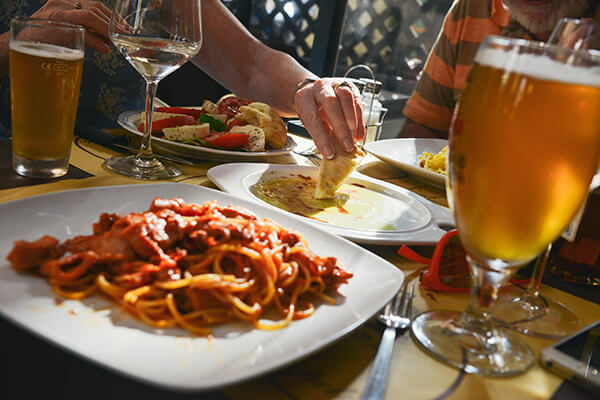
Food And Money: When you overeat or overspend, you isolate yourself because you don’t want people to see how much you eat or how much you overspend.
Many people isolate themselves because they are ashamed of how they look. They’re ashamed of their size and so on. I would encourage our audience to ask yourself what’s beneath that shame and what’s the cause of that shame? Allow yourself to go there. If you need help and support, get that help and support through therapy or support groups. There are many of those available nowadays. That’s a worthwhile endeavor rather than spending the hundreds and thousands of dollars that people are spending now on diets and the latest weight loss. Spend your money buying a book that would help you with this topic or spend your money seeing a therapist to help deal with past trauma or other abuse issues in the past and low self-esteem. Do you mind if I ask you if you ended up doing any therapy work and if you have had any childhood issues that led to your getting to this place?
Yes to all of it. When I was 21 years old, I was a victim of rape and right after that, I didn’t deal with it at all. I pushed it away because I was taught, “You get up, you brush yourself off and you deal with it.” For years, I did not make the correlation between how I was feeling emotionally and what I was doing financially. I was in free fall for years and I finally went to go see my chiropractor who’s helped me become aware of how the rape has impacted my life, my relationship with men, my relationship with food and my relationships with money. Just because he brought it to my attention, I wasn’t ready to deal with it at that time. With me going back to school, I lost my job at the time and I decided to go back to school. I thought it was a great time and I had all these other traumas that came upon me. My dad died, my mom was diagnosed with Alzheimer’s and I was under an incredible amount of stress. I was eating so much. At that time, I didn’t have any money, so I couldn’t spend but I was eating so much. I sat there thinking, “You cannot live your life this way.” I do go see a therapist. I do see them all the time and it helps.
To me, therapy gives you another perspective because you’re always in your own head. I always felt like I’m always in that negative self-talk. I’m always in my own head and my therapist she’s like, “No, Francine, that’s not how it is.” She comes with the simplest thinking, the simplest perspective. It’s such a revelation to me because I’m like, “I never even thought about it that way.” It’s been good. This is the first time in my life and I get a little emotional about it. I’m so excited because now I know I’m facing the demons that I’ve had. I can move forward confidently and deal with the normal stresses of life. I can deal with them comfortably and I can deal with them in a healthy way. I don’t have to eat or be so out of control.
[bctt tweet=”You have to find that place that gives you those type of emotions or those types of feelings where you’re at peace. ” username=”CarolynCRossMD”]Thank you so much for sharing that part of your story. It’s something that people are reluctant to talk about and especially as black women. There’s even a name for what you described, it’s called a strong black woman syndrome. As black women, we know we were raised by strong black women who had to deal with a lot of stuff and grandmothers who had to deal with a lot of stuff. The deal was you brush yourself off and keep going, don’t worry about it, don’t think about it, don’t deal with it and that’s what happens. There may be other people like us who are from the black community and know that strong black woman syndrome. It’s great in that it gets you through a lot of crap. It can be bad when you feel like you don’t need help.
That was one of the biggest things I learned when I was diagnosed with chronic fatigue syndrome. I couldn’t work for two years and was destitute, I almost lost everything. I couldn’t practice medicine. I kept pushing myself. Finally, I realized that the cause of my problem was that I was pushing myself despite being sick and not being able to function. I had to ask for help and that was the hardest thing I ever did, to ask someone to pick up my child from school, to try to get a friend to bring me something to eat or whatever I needed. Asking for help was so far out of my comfort zone. It was ridiculous. I kept thinking I can do it. That was part of the things that I learned, and I think that’s part of what you were describing.
When we share our stories, people are like, “You went through some stuff too.” It gives them the freedom to share their own story. Now they can come out and have love and be encouraged because they’re not alone in this whole process. Thank you for having me on. I enjoyed it. I love sharing my story.
Your story is a great one and it brings up a lot of topics that we don’t talk enough about. I hope to have you on again sometime soon because there are still a lot more on this topic that we haven’t even covered.
I would definitely love it.
Francine, thanks for being on this show. I look forward to talking to you soon.
Thank you so much.
Important Links:
About Francine Rogers
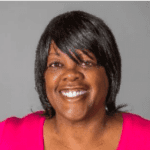 Francine Rogers
Francine Rogers
PO BOX 153412
San Diego, CA 92195
877-803-8241
Email – francine@purposefulcreditsolutions.com
Website – www.purposefulcreditsolutions.com
Francine Rogers previously worked at a large wholesale brokerage company where she worked as a Professional Liability Account Executive. She went back to school and graduated in 2016, with her degree in Business Administration at the University of San Diego. While attending USD, she had to face her own disastrous finances and she began the process of restoring her credit. In addition to restoring her credit, she began to learn about personal finances and creating wealth through investing and credit leveraging. Although her credit score had increased, she realized that she had to change her “poverty attitude” to a wealth building mindset. Francine believes to truly eradicate debt, you must delve into the emotional reasons as to why debt was accumulated in the first place. In her credit restoration process, she examines client’s financial goals and employs a direct, upfront approach in working with individuals to achieve their desired results. Francine has spoken at numerous personal finance workshops around San Diego County and is currently pursuing her FCRA certification by the Credit Consultants Association, along with certification as a personal finance counselor. She currently lives in San Diego and enjoys reading and spending time with family and friends.
EDUCATION
B.A. University of San Diego, Business Administration, 2016
Certified Credit Consultant

